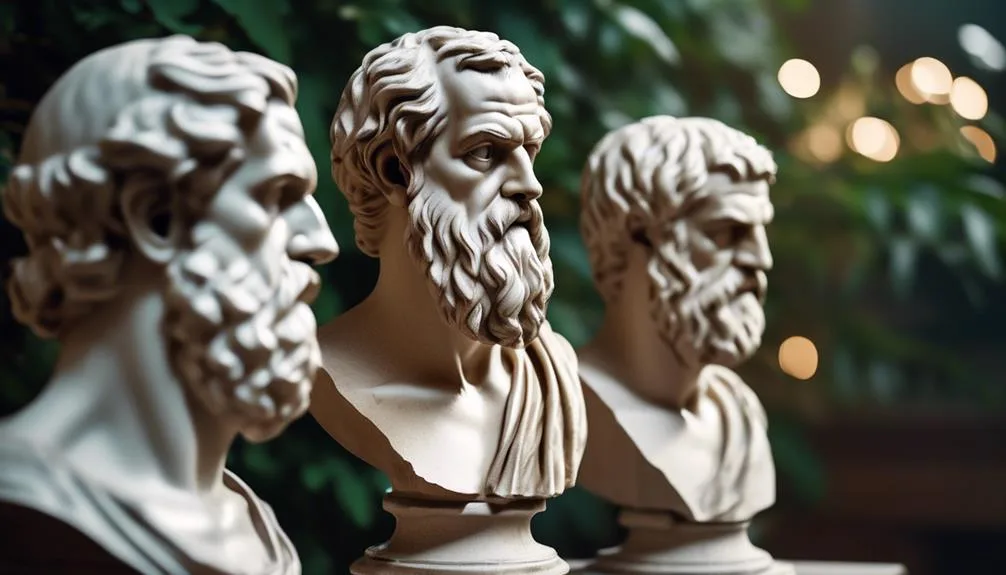Are you tired of chasing after fleeting moments of happiness? Wondering if there's a deeper, more meaningful path to true fulfillment?
Well, brace yourself, because this article is about to reveal the secrets of eudaimonia – a concept that has captivated philosophers for centuries.
But what exactly is eudaimonia? And how can it lead you to lasting happiness? Stay tuned as we unravel the wisdom of ancient thinkers and explore the role of external factors in achieving eudaimonia.
Get ready to unlock the secrets of genuine happiness and discover practical tips for applying it to your own life.
Are you ready to embark on this transformative journey?
Key Takeaways
- Eudaimonia is often translated as happiness, welfare, flourishing, or wellbeing.
- Eudaimonia is about fulfilling one's true nature and virtuous potentials.
- Socrates, Plato, and Aristotle all believed that virtue played a crucial role in achieving eudaimonia.
- External factors, such as external goods and luck, can also influence our happiness according to Aristotle.
Definition and Historical Background
What is the true meaning and historical context of eudaimonia, the concept often translated as happiness, welfare, or flourishing?
Eudaimonia, a term originating from Aristotle's Nicomachean Ethics, encompasses fulfilling one's true nature and virtuous potentials. The word itself combines the Greek words eu (good) and daimon (spirit).
Eudaimonia has had a significant influence on philosophy, with Athenian philosophers like Socrates and Plato discussing similar concepts. Socrates believed that virtue was essential for achieving eudaimonia, emphasizing the individual's attainment of the ultimate good. Plato considered virtue integral to eudaimonia, suggesting that individuals experience unhappiness when acting contrary to virtue.
Aristotle believed that eudaimonia arose from rational activity, with virtue being necessary but not sufficient. Happiness and wellbeing were attained through the way we live our lives.
Understanding the meaning and interpretation of eudaimonia and its influence on philosophy allows for a deeper understanding of this concept and its significance in our lives.
Perspectives From Socrates, Plato, and Aristotle

Socrates, Plato, and Aristotle each offered unique perspectives on the concept of eudaimonia, shedding light on the role of virtue and the pursuit of the ultimate good in achieving true happiness and fulfillment.
Socrates believed that virtue was a form of knowledge. He saw virtues like justice and courage as united and necessary for eudaimonia. Socrates emphasized the individual's achievement of the ultimate good, understanding that true happiness comes from living a virtuous life.
Plato, on the other hand, considered virtue integral to eudaimonia. He believed that individuals feel unhappiness when doing something wrong, emphasizing the importance of moral thought and behavior.
Aristotle believed that eudaimonia came from rational activity. While virtue was necessary, it wasn't sufficient for eudaimonia. Aristotle understood that happiness and wellbeing were achieved through how we live our lives, using our rationality to pursue the ultimate good.
These ancient philosophers provide valuable insights into the path to true happiness and fulfillment.
Role of Externalities

External factors play a significant role in the pursuit of eudaimonia, as emphasized by Aristotle. While virtue and self-realization are crucial, external factors such as luck and external goods can influence our overall happiness and fulfillment. These externalities can shape our circumstances and opportunities, ultimately impacting our pursuit of eudaimonia. To better understand the influence of external factors on eudaimonia, let's examine the role of luck in achieving true happiness.
| Influence of External Factors on Eudaimonia | The Role of Luck in Achieving Eudaimonia |
|---|---|
| External factors can provide favorable circumstances for pursuing eudaimonia, such as a supportive social environment or financial stability. | Luck can play a role in determining the opportunities and resources available to individuals in their pursuit of eudaimonia. |
| Conversely, external factors like adversity or lack of resources can hinder the achievement of eudaimonia. | Unforeseen events and chance encounters can shape one's path towards eudaimonia, either positively or negatively. |
| While internal factors are vital, recognizing the influence of external factors allows for a holistic understanding of the pursuit of eudaimonia. | Luck can either align with or challenge one's efforts to live a virtuous and fulfilling life, highlighting the interplay between personal agency and external circumstances. |
Modern Psychology and Eudaimonia

As we explore the intersection of modern psychology and eudaimonia, we can uncover valuable insights into the pursuit of human flourishing and subjective wellbeing.
Positive psychology, a branch of psychology that focuses on human flourishing and happiness, aligns well with the concept of eudaimonia.
Psychologists have attempted to define and operationalize eudaimonia, leading to the development of various scales and measures to assess human experiences of eudaimonia.
These measures allow researchers to study eudaimonia in the context of subjective wellbeing and psychological wellbeing.
By understanding the measurement of eudaimonia, psychologists can gain a deeper understanding of how individuals can achieve true happiness and fulfillment in their lives.
This knowledge can inform interventions and practices aimed at promoting eudaimonia and enhancing overall wellbeing.
Practical Applications and Tips

To achieve eudaimonia, it's essential to understand practical applications and implement effective tips in your daily life. Achieving fulfillment and finding purpose are key elements in the pursuit of true happiness.
One practical application is to know your life goals. Take the time to reflect on what truly matters to you and what brings you a sense of meaning and fulfillment. Once you have identified your goals, focus your capabilities and skills towards achieving them.
Develop your best potentials by investing time and effort into honing your strengths and talents. Get engaged in activities that align with your passions and values.
Conclusion

In conclusion, the journey towards eudaimonia is a deeply introspective and purpose-driven pursuit, centered around understanding and actualizing one's true nature and virtuous potentials. As you embark on this path, there are several key benefits of eudaimonia in your daily life to consider:
- Increased happiness and fulfillment: By aligning your actions with your true nature and virtues, you'll experience a sense of deep satisfaction and contentment.
- Improved relationships: Eudaimonia emphasizes the cultivation of virtuous qualities such as kindness, compassion, and fairness, which can enhance your interactions and connections with others.
- Enhanced personal growth: Striving for eudaimonia requires continuous self-reflection and self-improvement, leading to personal growth and the realization of your full potential.
The importance of virtue in eudaimonia can't be overstated. Virtuous qualities such as wisdom, courage, justice, and temperance are essential for living a flourishing and meaningful life. They serve as guiding principles for making ethical choices and pursuing the highest good. By embracing virtue, you cultivate qualities that contribute to your own well-being and the well-being of those around you.
Ultimately, eudaimonia offers a path to true happiness, where you can live a life of purpose, authenticity, and fulfillment.
Frequently Asked Questions
How Does Eudaimonia Differ From Other Concepts of Happiness?
Eudaimonia differs from other concepts of happiness by focusing on fulfilling one's true nature and virtuous potentials, rather than solely seeking pleasure (hedonism). It also aligns with psychological well-being, emphasizing personal growth and flourishing.
What Are Some Potential Barriers or Obstacles to Achieving Eudaimonia?
Some potential barriers or obstacles to achieving eudaimonia include societal pressures, self-doubt, fear of failure, and external circumstances beyond your control. Overcoming these challenges requires self-reflection, resilience, and a commitment to personal growth.
Can External Factors, Such as Wealth or Social Status, Contribute to Eudaimonia?
External factors, such as wealth and social status, can contribute to eudaimonia to some extent. Wealth can provide opportunities for personal growth and fulfillment, while social status can impact one's sense of belonging and self-esteem.
How Does Eudaimonia Relate to Personal Growth and Self-Actualization?
Personal growth and self-actualization are key aspects of eudaimonia. By developing your unique potentials and striving towards self-fulfillment, you can achieve true happiness. It's about understanding yourself and living in alignment with your core values and beliefs.
Are There Any Cultural or Societal Factors That Influence the Pursuit of Eudaimonia?
Cultural norms and societal expectations greatly influence the pursuit of eudaimonia. These factors shape our values, beliefs, and behaviors, impacting our understanding of true happiness and the path we choose to follow.
Conclusion
Congratulations! You have completed your journey towards uncovering the secrets of eudaimonia – the path to true happiness.
Just like a flourishing garden, eudaimonia requires nurturing and cultivation.
By living in alignment with your true nature and embracing virtuous potentials, you can experience profound fulfillment.
Remember, happiness isn't found in momentary pleasures, but in the pursuit of a meaningful life.
So, start tending to your own garden of eudaimonia and watch your happiness blossom.

